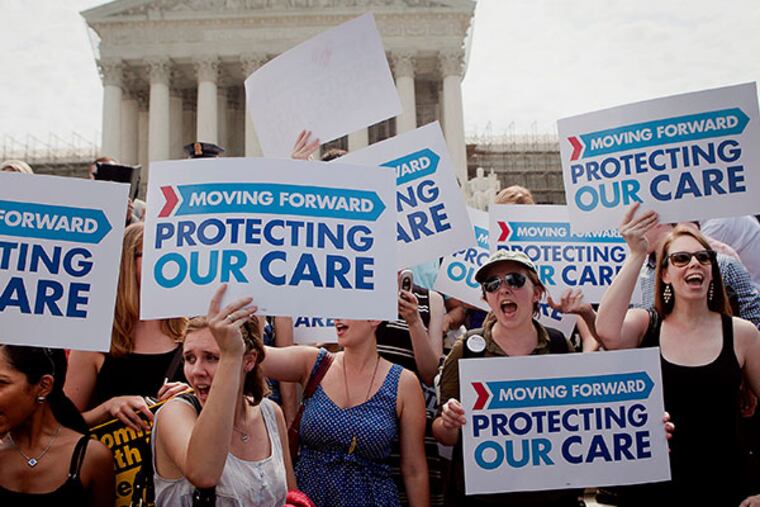Law Review: Detailing his analysis of the fight over Obamacare
Josh Blackman is a young, conservative law professor who has been getting plenty of attention for his history of the legal fight over Obamacare.

Josh Blackman is a young, conservative law professor who has been getting plenty of attention for his history of the legal fight over Obamacare.
Legal experts across the spectrum, including Harvard University's Lawrence Tribe and Georgetown University Law Center's Randy Barnett, a leading libertarian, have heaped praise on Blackman's book, Unprecedented: The Constitutional Challenge to Obamacare.
It provides a granular account of how the legal - and political - battle over the Affordable Care Act was joined, and how so much about the fight departed from past pattern.
So when Blackman walked to the lectern Monday in a conference room on the 26th floor of an office tower near Logan Square to address the city's chapter of the conservative Federalist Society, the audience seemed ready to hang on every word.
But for conservatives, it wasn't a happy talk. And maybe not for liberals, either.
All of 29 years old, Blackman - who did his undergraduate work at Pennsylvania State University, and clerked for U.S. District Judge Kim R. Gibson in Johnstown after graduation from George Mason University Law School - is a bit of a legal polymath. He can, with seeming ease, assimilate disparate streams of legal analyses, facts, political events, and government policy in service of his arguments.
One of those arguments is that, in some form or another, Obamacare is here to stay. Republicans, demoralized after the law was upheld by the Supreme Court in 2012, have lately taken heart that its dysfunctional and incompetent design and poorly executed launch will cause it to collapse of its own weight.
But Blackman believes that much of it will survive simply because Congress doesn't have the political will to take away insurance from people who already have it.
"In a twisted bit of irony, if Obamacare is repealed, people who like their insurance won't be able to keep it," said Blackman, an assistant professor at South Texas College of Law. "It will be the same thing all over again."
That means the millions of additional Medicaid patients covered under Obamacare, along with millions of others in the subsidized state and federal health-care exchanges, likely will keep their insurance. This, Blackman says, is the most probable denouement even if Republicans keep the House, win a veto-proof majority in the Senate, and take back the White House.
Blackman's message isn't all that salutary for Democrats, either. In saving Obamacare by upholding the individual mandate - the requirement that all Americans carry health insurance or pay a penalty - the Supreme Court also permitted states to decline to participate in the administration's vast expansion of Medicaid, the state and federal health-care program for the poor. So far, 23 states have declined to do so, effectively setting up a two-tiered national health system.
There are many dysfunctional aspects of Obamacare, not the least of which is its requirement that insurers provide coverage to people who already are sick but have not purchased insurance. The penalties for not carrying insurance were supposed to have minimized this problem.
But the penalties are low and, in any case, have been suspended by the Obama administration for people - the administration says 500,000, its opponents contend the number is in the millions - who have had their insurance policies canceled as a result of the law. This is the equivalent of buying home insurance after the house has burned down.
And the problems go well beyond individuals. Large employers, though afforded more leeway, are puzzling over how to provide coverage in the newly redesigned marketplace, often without clear guidance.
"There is so much stuff up in the air," says Fox Rothschild labor and employment lawyer James A. Matthews III, who was not at the Federalist Society meeting but spends much of his working life sorting through Obamacare problems for clients. "The biggest concern that employers have is the ongoing uncertainty over how this is all going to work."
Blackman says he doesn't know for sure, but suggests that the barrage of commentary from the president and others claiming the court would be out of bounds if it overturned the law might have influenced Chief Justice John G. Roberts Jr. to cast the deciding vote in its favor.
I find that implausible. Roberts was a neighbor of mine for several years in Bethesda, Md., before his appointment to the U.S. Court of Appeals for the District of Columbia Circuit and while he was a top appellate lawyer in Washington. We regularly saw him at backyard barbecues and other social events. He struck me as far too sophisticated - and sure of himself - to be influenced by political hyperventilating.
One critical flaw, Blackman says, is that Democrats never were able to persuade Republicans - any Republicans in Congress, in fact - to support the measure. That guaranteed stiff opposition after the bill was signed.
"The fact that there was no bipartisan buy-in means you were always going to have this fierce battle to the end. And when you have this many people who are invested in defeating the law," he said, "it is very difficult to accomplish that kind of change" to the health-care system.
This being an election year, that conflict surely will play out nationally, and with undiminished intensity.